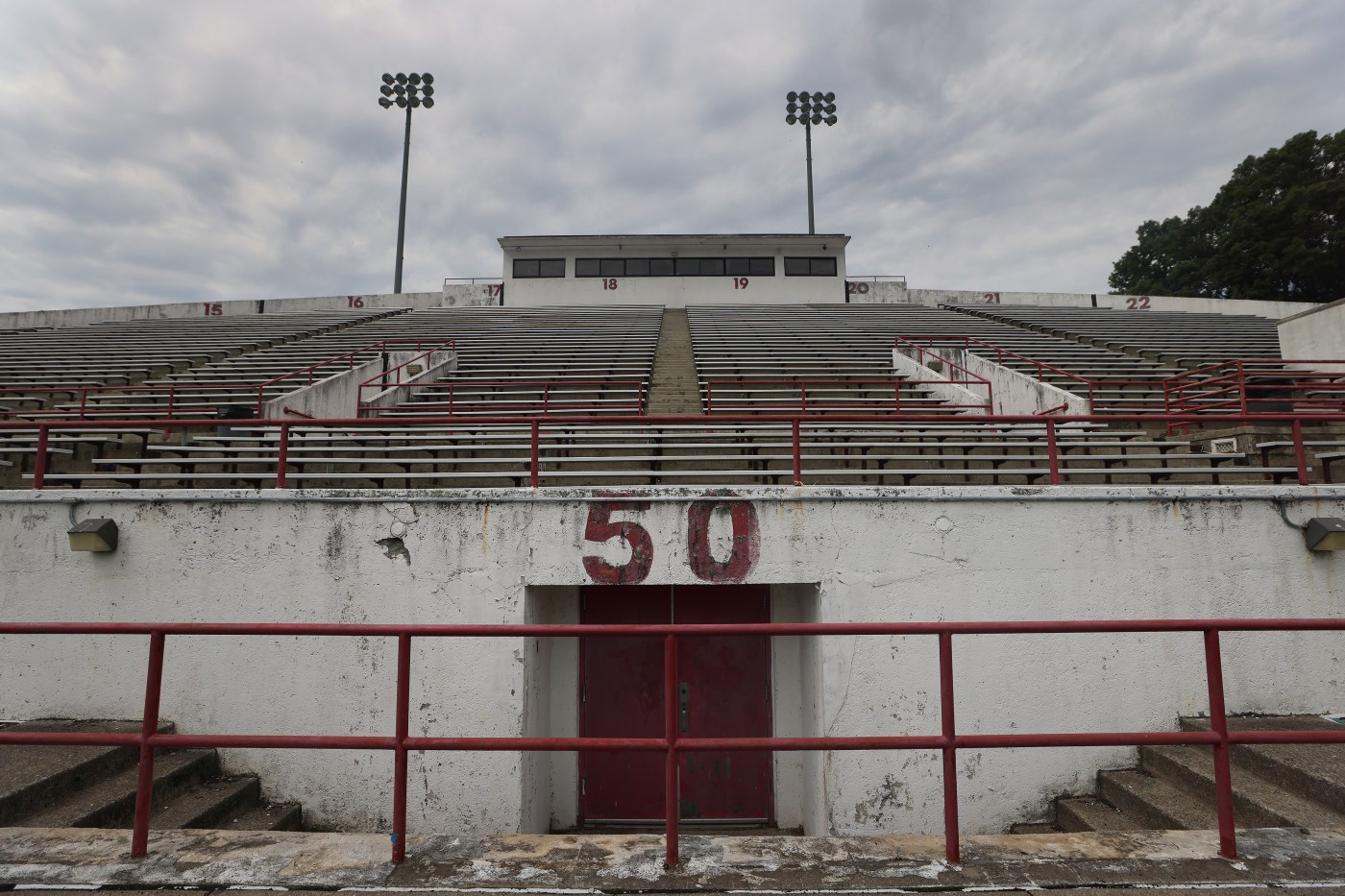
Boston mayor, pro soccer team cleared to demolish White Stadium after heated debate
The city of Boston’s plan to transform a dilapidated stadium in Franklin Park into a new facility fit to house a professional soccer team cleared a key hurdle on Monday, when the Parks Commission approved plans to demolish White Stadium.
The board’s unanimous vote came after a heated community debate, where opponents and supporters of the project put forward by Mayor Michelle Wu and Boston Unity Soccer Partners argued fiercely about whether the public-private plan would truly benefit Boston Public Schools student-athletes, who, per the mayor, would have use of the new facility a majority of the time.
“Clearly, we’re hearing people speak in ways that are very passionate on both sides of the equation here,” Eugene Bolinger, a parks commissioner, said prior to the day’s vote. “It seems to me that we have a facility that some might consider to have been an intrusion way back in the 1940s, but now we have an intrusion from the 1940s that’s in deplorable condition.
“It seems to me that having a facility that accommodates the needs of the Boston Public School system and the community at large is a really critical aspect of this proposal, and it seems like that’s being accomplished under the proposal we have.”
While Bolinger’s assessment was reflected in the commission’s unanimous vote, it was not shared by all segments of the community that participated in the day’s meeting, where stakes were high, given the vote represented arguably the last major approval needed for the contentious proposal to move forward.
The mayor’s office said the city, which will maintain ownership of the land, is finalizing a lease agreement with Boston Unity Soccer Partners, and demolition will begin in the fall after that process is completed. The city and Boston Unity, an all-female ownership group that includes Boston Globe CEO Linda Pizzuti Henry as one of its investors, are set to kick in $50 million apiece for renovations.
Opponents of the project argued that the city’s approval process has been rushed and did not properly take into account concerns community members have over transportation and parking challenges that will be exacerbated with an 11,000-seat stadium, given the relatively small parking lot at Franklin Park.
“I want you to know the process has not been fair and it’s not been clear,” Louis Elisa, president of the Garrison Trotter Association, said, adding that he was “appalled” by the false information he felt city officials were sharing with the Parks Commission during the meeting.
Highlighting the opposition is an ongoing lawsuit filed by the Emerald Necklace Conservancy and 20 neighbors, including Elisa, that alleges the proposed project is unconstitutional privatization of public land — a claim of illegality the city denies. The mayor’s office says that, per state law, White Stadium is managed as a BPS school facility, rather than public parkland subject to Article 97 state review for a new use.
A Suffolk Superior Court judge tossed the plaintiffs’ push for a preliminary injunction intended to halt the lawsuit in March, but the case is still active, and the group’s attorney cautioned the city against proceeding with demolition while a “final decision” on the matter is pending.
“Once it’s down, it’s down,” Alan Lipkind, the plaintiffs’ attorney, said.
Supporters, many of whom included parents and coaches of BPS student-athletes, accused the opponents of thinking more about themselves, rather than the BPS kids who are set to benefit from much-needed improvements to a dilapidated park and stadium, where half of the grandstands are burned out from a recent fire.
“I’m there every single day,” said Nas Rivera, a BPS track coach. “The track is terrible. The entire thing needs to get destroyed and built back up.”
Another track coach, Ted Loska, said he “can’t explain how horrible the place is,” saying that the conditions at White Stadium are so bad that when he takes BPS students to suburban tracks for meets, “it’s an eye-opener for them.”
“What we have at White Stadium is, at best, horrible,” Loska said. “If we kill this, there will be another generation at least before anybody gets momentum again to do something.”
Renee Stacey Welch, a Jamaica Plain activist and a plaintiff in the lawsuit, pushed back on the assertion that opponents of the project were not thinking of the kids, saying that the neighbors all favor renovations at the park, but are against a plan that they insist will privatize community land and favor a professional sports team.
“Let’s be honest,” Stacey Welch said, “You’re not doing this because you really care about this community. You’re doing this to make money.”
She later added, “It doesn’t take $50 million or more to rehab that park for us, for our kids, for our community. We do not need a beer garden. We do not need luxury boxes that I can’t afford. This isn’t for us, and it sure as hell is not for our kids.”
Related Articles
Advocates make final push to stop Boston, pro soccer team’s plans for White Stadium redevelopment
City Council hits mayor, commissioner over BPD demotion: ‘Troubling’
Boston City Council pushes for mayor to present ‘Plan B’ after tax plan flames out on Beacon Hill
Former Boston city councilor Kendra Lara avoids jail time in 2023 crash, ordered to apologize to homeowner
Boston City Council calls for emergency declaration over Steward’s Carney Hospital closure
The plaintiffs insist the project will displace BPS student-athletes to accommodate professional soccer games and practices on weekends during the prime warmer-weather months of April to November. The new pro soccer team is expected to take the pitch for the first time in the spring of 2026.
Mayor Wu has said BPS student-athletes and the community will have use of the park 90% of the time, while Boston Unity has touted the 1,000 additional stadium seats and 300 new permanent jobs that will be created by the project.
“This unanimous support from the Boston Parks Commission affirms the many months of community engagement that have shaped every aspect of the plan for White Stadium, and we’re thrilled to move forward with delivering a state-of-the-art facility and generational investment in Franklin Park for Boston Public Schools students, neighborhood residents, and all those who love the park,” Wu said in a statement.
“This project,” the mayor added, “will greatly expand access for BPS students and the general public, add new public amenities, open up new green space to the park, and provide the resources to professionally manage and maintain the stadium for generations to come.”

